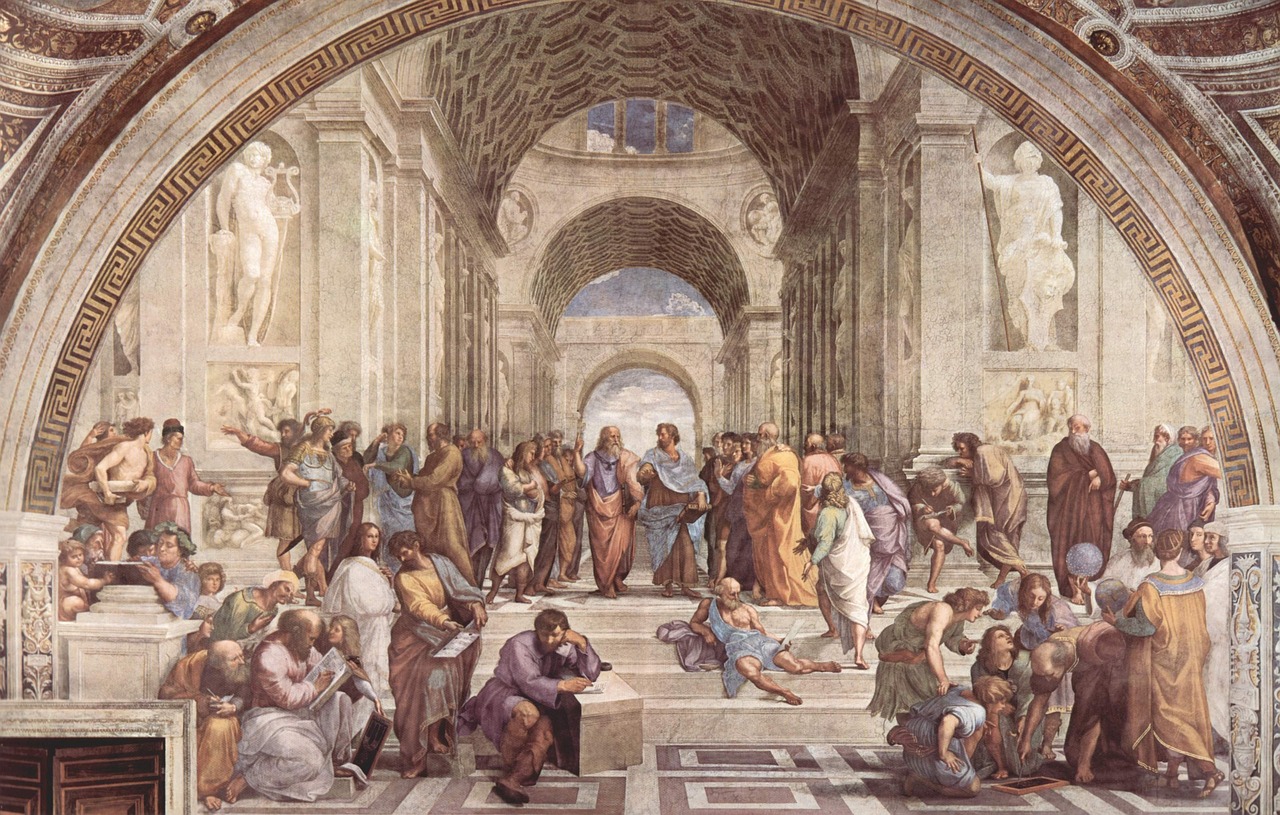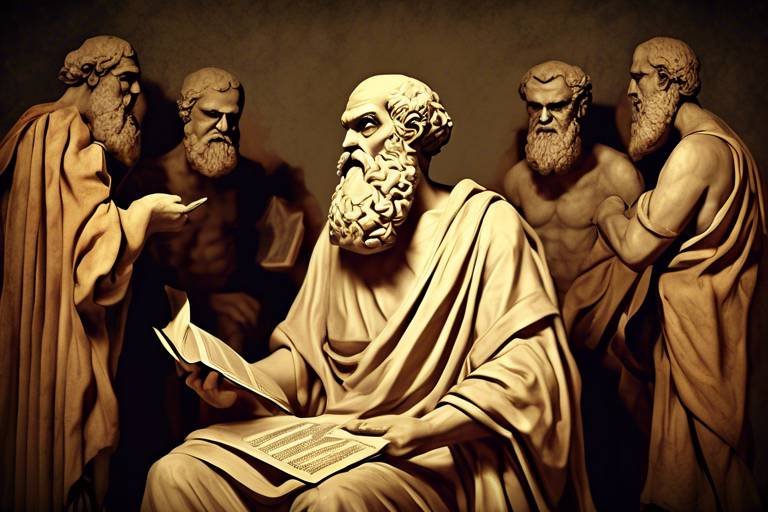Understanding David Hume's Empirical Philosophy
David Hume, a towering figure in the realm of modern philosophy, is celebrated for his profound insights into human understanding and the nature of knowledge. His empirical philosophy lays the groundwork for how we perceive the world, emphasizing that all knowledge originates from sensory experiences. Imagine walking through a bustling market: the vibrant colors, the cacophony of sounds, and the myriad of smells all contribute to your understanding of that environment. This experience is what Hume refers to as empiricism—the idea that our knowledge is rooted in what we can see, hear, touch, taste, and smell. In this article, we will delve into the core principles of Hume's philosophy, exploring his views on knowledge, perception, causation, and the intricate workings of the human mind.
At the heart of Hume's philosophy lies the concept of empiricism, which asserts that knowledge is primarily derived from sensory experience. Hume challenges the rationalist perspective that reason alone can lead us to knowledge. Instead, he posits that our understanding of the world is built upon the foundation of our experiences. Think of it like constructing a house: without solid bricks—our sensory experiences—no amount of reasoning or abstract thought can create a stable structure. Hume's empiricism invites us to reconsider how we acquire knowledge, suggesting that our perceptions are the building blocks of understanding.
To further elucidate his empirical approach, Hume introduces the distinction between impressions and ideas. Impressions are the immediate, vivid experiences we encounter, while ideas are the faint images or reflections of those impressions in our mind. For instance, when you see a beautiful sunset, the vibrant colors and the warmth you feel are impressions. Later, when you recall that sunset, the memory you conjure is an idea. Hume argues that all ideas originate from impressions, creating a direct link between our experiences and our thoughts.
Impressions, according to Hume, are the raw data of our experiences. They are characterized by their force and liveliness, making them the primary source of knowledge. Consider how a sudden loud noise can startle you; that immediate reaction is an impression. Hume emphasizes that impressions are not just passive experiences; they actively shape our understanding of reality. They serve as the foundation upon which we build our knowledge, making them crucial in Hume's epistemology.
Ideas, on the other hand, are less vivid and arise from our impressions. Hume elaborates that our thoughts and concepts are essentially derived from what we have experienced. For example, if you've never seen an elephant, you cannot conjure an idea of one without having first encountered an impression of it. This relationship highlights the importance of our experiences in shaping our cognitive processes. Hume's assertion that ideas are dependent on impressions reinforces the notion that our understanding of the world is inherently tied to our sensory experiences.
Hume's analysis of causation is particularly groundbreaking, as it challenges traditional notions of cause and effect. He argues that our understanding of causation is not based on logical deduction but rather on habit and custom. When we observe events occurring in succession—like a seed growing into a tree—we naturally infer a causal relationship. However, Hume prompts us to question whether this inference is justified. Are we truly witnessing causation, or are we merely observing patterns that we have come to expect? This skepticism invites us to rethink our assumptions about the natural world.
The problem of induction poses a significant challenge to empirical reasoning. Hume argues that while we may observe regularities in nature, such as the sun rising every morning, we cannot rationally conclude that these patterns will continue indefinitely. This uncertainty raises profound questions about scientific inquiry. If our inductive reasoning is not grounded in certainty, how can we trust our scientific laws? Hume's insights compel us to recognize the limitations of our reasoning processes and to approach knowledge with a sense of humility.
Hume asserts that our understanding of causation is deeply rooted in custom and habit. Instead of relying on rational deduction, we form beliefs based on repeated experiences. For instance, if you drop a ball and it falls to the ground every time, you develop an expectation that it will always do so. This reliance on habit shapes our beliefs and expectations about the world around us. Hume's exploration of custom and habit reveals how our cognitive processes are influenced by our experiences, further emphasizing the empirical nature of his philosophy.
Hume's views on the self challenge the notion of a permanent identity. He argues that what we consider the 'self' is not a singular, unchanging entity but rather a collection of experiences and perceptions over time. Just as a river is ever-flowing and changing, so too is our identity shaped by the continuous stream of experiences we encounter. This perspective invites us to embrace the fluidity of our identities and to recognize that our understanding of ourselves is constructed through our interactions with the world.
- What is Hume's main contribution to philosophy? Hume's primary contribution lies in his empirical approach to knowledge, emphasizing that all understanding stems from sensory experiences.
- How does Hume differentiate between impressions and ideas? Impressions are immediate, vivid experiences, while ideas are the faint mental representations derived from those impressions.
- What is the problem of induction? The problem of induction questions the validity of inferring future occurrences based on past experiences, highlighting the limitations of empirical reasoning.
- How does Hume view personal identity? Hume posits that personal identity is not a fixed entity but rather a collection of experiences and perceptions that change over time.

The Nature of Empiricism
At the heart of David Hume's philosophical inquiry lies empiricism, a concept that asserts that knowledge is primarily derived from sensory experience. Imagine standing on a bustling street corner, where the sights, sounds, and smells envelop you. This vivid sensory engagement is what Hume considers the foundation of all human understanding. Rather than relying on abstract reasoning or innate ideas, Hume insists that our perceptions of the world around us are the starting point for all knowledge. In this way, he shifts the focus from the mind's innate capabilities to the rich tapestry of experiences that life offers.
Hume's empiricism is not merely about collecting sensory data; it is about how these experiences shape our understanding of reality. He argues that human cognition operates through a process of observation and reflection. For Hume, knowledge is built upon the raw materials of our experiences—what he terms "impressions." These impressions are the immediate sensations we receive from the world, and they serve as the building blocks for forming more complex ideas. Think of impressions as the vibrant colors on an artist's palette, each one essential for creating a beautiful painting of our understanding.
In Hume’s view, the mind plays a crucial role in synthesizing these impressions into coherent ideas. However, he is careful to delineate between the two. Impressions are the direct, forceful experiences, while ideas are the faint images that linger in our minds after the impressions have faded. This distinction is fundamental to Hume's epistemology, as it underscores the importance of empirical evidence in the formation of knowledge. Without the initial impressions, our ideas would be mere figments of imagination, lacking any grounding in reality.
To illustrate this further, consider the following table that summarizes the key differences between impressions and ideas in Hume's philosophy:
| Aspect | Impressions | Ideas |
|---|---|---|
| Definition | Direct sensory experiences | Mental representations derived from impressions |
| Characteristics | Vivid, forceful, and immediate | Fainter, less vivid, and derived from memory |
| Examples | Seeing a sunset, tasting chocolate | Remembering the colors of the sunset, imagining the taste of chocolate |
Hume’s emphasis on empiricism leads to a profound shift in how we understand knowledge acquisition. He posits that all human beliefs and ideas must ultimately be traceable back to our sensory experiences. This perspective not only challenges the rationalist view that knowledge can be derived from reason alone but also invites us to question the reliability of our perceptions. After all, if our understanding is based solely on what we experience, how can we be sure that our senses are not deceiving us?
In conclusion, Hume’s exploration of empiricism invites us to engage with the world around us in a more thoughtful and reflective manner. By grounding our understanding in sensory experiences, we can appreciate the complexity of human cognition while recognizing the limitations that come with it. This approach not only enriches our grasp of knowledge but also emphasizes the importance of critical thinking in navigating our experiences. Empiricism, as Hume articulates, is not just a philosophical stance; it is a way of life that encourages us to seek knowledge through observation and reflection.

Impressions and Ideas
David Hume's philosophy is like a treasure map leading us through the intricate landscape of human understanding, and at the heart of this map lie two essential components: impressions and ideas. Hume meticulously distinguishes between these two elements, laying the groundwork for his entire epistemology. But what exactly are impressions and ideas? Think of impressions as the vivid snapshots of our experiences—those raw, intense feelings we get when we touch something hot or hear a beautiful melody. They are immediate and powerful, forming the foundation upon which our knowledge is built.
In contrast, ideas are the softer echoes of those impressions. They are the mental representations we construct in our minds after experiencing something. For instance, after feeling the warmth of the sun on your skin, you might conjure up the idea of 'warmth' even when the sun isn't shining. Hume argues that all our ideas stem from these impressions, which means that without first experiencing something, we can't form a coherent idea about it. This relationship between impressions and ideas is crucial, as it emphasizes that our understanding of the world is not just a product of rational thought but is deeply rooted in our sensory experiences.
To dive deeper, let’s unpack what Hume means by impressions. Impressions are the direct products of our sensory experiences, encompassing everything we see, hear, touch, taste, and smell. They are characterized by their vividness and immediacy. When you experience an impression, it feels real and undeniable, almost like a snapshot that your mind captures in the moment. Hume categorizes impressions into two types: simple impressions, which are singular and straightforward (like the color red), and complex impressions, which are combinations of simple impressions (like a red apple). This categorization is significant because it helps us understand how our minds process the world around us.
Now, let’s shift our focus to ideas. As mentioned earlier, ideas are the mental images or concepts that arise in our minds after we have experienced impressions. Hume elaborates that ideas can be simple or complex as well. Simple ideas are those that directly reflect simple impressions, while complex ideas are formed by combining various simple ideas. For example, if you see a dog (an impression), you might have a simple idea of 'dog' that includes its characteristics, like being furry and four-legged. However, if you start to think about all the dogs you’ve encountered, you create a complex idea that encompasses various breeds, sizes, and personalities.
This relationship between impressions and ideas is not just a philosophical exercise; it has profound implications for how we understand knowledge and reality. Hume argues that since all ideas originate from impressions, any idea that cannot be traced back to an impression is meaningless. This perspective challenges us to reconsider our assumptions about knowledge and the nature of reality. It raises questions like, “Is it possible to have an idea of something we’ve never experienced?” Hume would likely answer with a resounding no, urging us to remain grounded in our sensory experiences.
Ultimately, Hume's exploration of impressions and ideas reveals a fascinating interplay between our sensory experiences and the mental constructs we create. He invites us to consider how our understanding of the world is shaped not just by abstract reasoning but by the vivid, immediate experiences that life has to offer. By emphasizing the importance of impressions, Hume encourages us to remain curious and engaged with the world around us, reminding us that every idea we hold is deeply rooted in our lived experiences.
- What is the difference between impressions and ideas according to Hume?
Impressions are the raw data of our sensory experiences, while ideas are the mental representations derived from those impressions. - Why are impressions considered more significant than ideas?
Hume believes that all ideas must originate from impressions; thus, impressions serve as the foundation for all human knowledge. - Can we have ideas without having impressions?
No, according to Hume, any idea that cannot be traced back to an impression is meaningless. - How do Hume's concepts of impressions and ideas influence modern philosophy?
Hume's ideas challenge the rationalist view that knowledge can be derived solely from reason, emphasizing the importance of sensory experience in shaping our understanding of reality.

Defining Impressions
When we talk about impressions in the context of David Hume's philosophy, we're diving into the very essence of our sensory experiences. Hume describes impressions as the immediate, vivid sensations we encounter in our daily lives. Think of them as the raw data that our minds collect from the world around us. Whether it's the bright colors of a sunset, the sharp sound of a bell ringing, or the taste of a delicious meal, these experiences are what Hume refers to as impressions. They are not just fleeting moments; they form the bedrock upon which our understanding of reality is built.
To grasp Hume's concept of impressions, it helps to contrast them with ideas. While impressions are direct and forceful, ideas are more subdued and abstract. Imagine impressions as the vibrant brushstrokes on a canvas, full of life and color, while ideas are the finished painting, a representation of those strokes that may evoke emotion but lack the immediate intensity of the original experience. This distinction is crucial because it underscores how our minds process and categorize the world.
Hume categorizes impressions into two main types: impressions of sensation and impressions of reflection. Impressions of sensation arise from our interactions with the external world—like the warmth of the sun on our skin or the scent of fresh flowers. On the other hand, impressions of reflection stem from our internal experiences, such as feelings of joy, sadness, or desire.
| Type of Impression | Description |
|---|---|
| Impressions of Sensation | Direct experiences from the external world. |
| Impressions of Reflection | Internal experiences based on our emotional responses. |
This categorization reveals a lot about how we construct our understanding of the world. Hume argues that all human knowledge ultimately stems from these impressions. Without them, we would have no basis for forming ideas, beliefs, or concepts. It's as if our minds are like a blank canvas, and impressions are the vibrant colors that allow us to create a meaningful picture of our experiences.
Furthermore, Hume emphasizes that impressions are not just passive occurrences; they actively shape our perceptions and beliefs. For instance, if you have a strong impression of fear when encountering a dog that barks aggressively, that impression will significantly influence your future interactions with dogs. This interplay between impressions and our subsequent ideas is a dynamic and ongoing process, one that Hume believed was fundamental to human cognition.
In essence, Hume's exploration of impressions lays the groundwork for understanding how we perceive reality. It invites us to consider: how much of our knowledge is truly original thought, and how much is simply a reflection of the impressions we've experienced? This inquiry into the nature of impressions not only challenges our preconceived notions of knowledge but also encourages a deeper appreciation for the richness of human experience.
- What are impressions according to Hume?
Impressions are the vivid and immediate sensations we experience from the world around us, forming the basis of all human knowledge. - How do impressions differ from ideas?
Impressions are direct and forceful experiences, while ideas are more subdued mental representations derived from those impressions. - Why are impressions important in Hume's philosophy?
Impressions are crucial because they provide the raw data that our minds use to form ideas, beliefs, and knowledge about the world.

Understanding Ideas
In the realm of David Hume's philosophy, the concept of ideas plays a pivotal role in shaping our understanding of the world around us. Hume categorizes ideas as the mental representations that arise from our impressions, which are the immediate experiences we gather through our senses. Imagine impressions as the vibrant colors on a painter's palette, while ideas are the finished paintings that emerge from those colors. This analogy highlights how ideas are not merely random thoughts but are deeply rooted in our sensory experiences.
Hume asserts that all ideas can be traced back to their corresponding impressions. For instance, when you hear the word "apple," the idea conjured in your mind is derived from past experiences of seeing, tasting, or smelling an apple. This connection between impressions and ideas underscores Hume's empirical approach to knowledge. He emphasizes that without the initial sensory experience, our ideas would lack substance and meaning. Therefore, the richness of our ideas is directly proportional to the depth of our impressions.
Moreover, Hume distinguishes between two types of ideas: simple ideas and complex ideas. Simple ideas are the basic building blocks of thought, derived directly from single impressions. For example, the color red or the taste of sweetness can be considered simple ideas. On the other hand, complex ideas are formed by combining multiple simple ideas. Think of a "fruit salad" as a complex idea; it includes various simple ideas like the taste of apples, oranges, and bananas, all mixed together. This classification helps us understand how our minds work by piecing together various experiences to form a coherent understanding of the world.
Another intriguing aspect of Hume's philosophy is his assertion that ideas can be altered or reshaped through the process of association. This means that our ideas can change based on how we connect them with other ideas, much like how a spider weaves a web by linking different strands. For instance, if you have a positive experience with a particular brand of chocolate, your idea of that brand may become intertwined with feelings of happiness, influencing your future choices. This fluidity in our ideas emphasizes the dynamic nature of human cognition and perception.
In summary, Hume's exploration of ideas reveals a profound connection between our sensory experiences and the mental representations we construct. By understanding the relationship between impressions and ideas, we gain insight into the very fabric of human thought. Hume's empirical philosophy invites us to appreciate the complexity and richness of our cognitive processes, reminding us that our understanding of the world is not fixed but rather a tapestry woven from the threads of our experiences.
As we delve deeper into Hume's philosophy, we cannot overlook the implications of his theories on our everyday lives. The way we perceive reality, form beliefs, and even engage in scientific inquiry is deeply influenced by the interplay of our impressions and ideas. This understanding encourages us to remain curious and open-minded, constantly seeking new experiences that enrich our mental landscapes.

Causation and Its Implications
Causation is a cornerstone of understanding the world around us, yet David Hume challenges the traditional views that many take for granted. Instead of accepting that every effect must have a cause, Hume invites us to scrutinize our beliefs about causation. He argues that our understanding of cause and effect is not derived from rational deduction but rather from our experiences and the patterns we observe in the world. This perspective leads us to question: Are we merely observing correlations, or is there something deeper at play?
Hume's skepticism about causation primarily revolves around the idea that we cannot directly perceive causal connections. For example, when we see a ball strike another ball and the second ball moves, we might instinctively think that the first ball caused the motion of the second. However, Hume posits that what we are really witnessing is a sequence of events that we have come to associate with one another through repeated experiences. This brings us to an important realization: our understanding of causation is heavily influenced by habit and custom.
To illustrate this concept, consider the following table that summarizes Hume's views on causation:
| Aspect | Traditional View | Hume's View |
|---|---|---|
| Nature of Causation | Cause and effect are inherent and observable. | Cause and effect are learned through experience. |
| Basis of Knowledge | Rational deduction and logical reasoning. | Sensory experiences and habitual associations. |
| Understanding of Events | Events have predetermined causes. | Events are linked through custom and expectation. |
Hume's perspective leads to the problem of induction, which poses a significant challenge to empirical reasoning. Induction relies on the assumption that the future will resemble the past; however, Hume argues that this assumption is not logically justified. For instance, just because the sun has risen every day in our experience does not guarantee it will rise tomorrow. This uncertainty raises questions about the reliability of scientific inquiry and the foundations of our knowledge.
Furthermore, Hume emphasizes that our beliefs about causation are shaped by custom and habit. When we repeatedly observe a certain sequence of events, we develop expectations about how things should unfold. For example, if a person consistently turns the key in a car ignition and the engine starts, they begin to associate the two actions as cause and effect. However, this association is not based on a rational understanding of causation but rather on a psychological tendency to form habits based on past experiences.
In summary, Hume's examination of causation invites us to reconsider how we understand the relationships between events in our lives. By highlighting the role of experience, custom, and habit in shaping our beliefs, he challenges us to think critically about the nature of knowledge itself. So, the next time you witness an event, ask yourself: Are you truly seeing causation, or are you merely witnessing a pattern that your mind has constructed over time?
- What is Hume's view on causation? Hume believes that our understanding of causation is not based on direct observation but rather on habitual associations formed through repeated experiences.
- What is the problem of induction? The problem of induction questions the justification of assuming that future events will resemble past events, highlighting the uncertainty in empirical reasoning.
- How do custom and habit influence our understanding of causation? Custom and habit shape our beliefs about causation by creating expectations based on past experiences, rather than through rational deduction.

Hume's Problem of Induction
David Hume's exploration of induction presents a significant challenge to our understanding of empirical reasoning. At its core, Hume's problem of induction questions the very foundation of how we derive knowledge from experience. To put it simply, if we observe that the sun has risen every day in our lives, can we justifiably conclude that it will rise again tomorrow? Hume argues that such conclusions are not based on logical necessity but rather on a habit of thought shaped by repeated experiences.
Hume asserts that our reliance on induction stems from a psychological tendency rather than a rational justification. This leads us to a critical realization: while we may expect the future to resemble the past, there is no inherent reason to believe this will always hold true. This skepticism is particularly troubling for the sciences, which often depend on inductive reasoning to formulate theories and predict outcomes. For instance, consider the following scenarios:
| Observation | Inductive Conclusion |
|---|---|
| The sun has risen every day for the past 10,000 days. | The sun will rise tomorrow. |
| All observed swans are white. | All swans are white. |
In both cases, Hume would argue that the conclusions drawn from these observations are not logically valid. Instead, they represent a customary belief based on past experiences. This realization can be unsettling, as it forces us to confront the limitations of our understanding. If we cannot rely on induction to predict future events, what does that mean for our knowledge of the world?
Hume's skepticism leads to a deeper inquiry into the nature of causation. He posits that our understanding of cause and effect is similarly rooted in habit and custom. We observe one event consistently following another, and over time, we come to expect that this relationship will persist. However, just as with induction, there is no logical guarantee that causation will hold in every instance. This insight reshapes our approach to scientific inquiry, emphasizing the need for caution and humility in our assumptions about the natural world.
In summary, Hume's problem of induction challenges us to reconsider the way we acquire knowledge. It reveals the fragile foundation upon which our understanding of causality and prediction rests. Instead of viewing our experiences as definitive proof of future occurrences, we are reminded that our beliefs may often be nothing more than reflections of past patterns. This realization not only enriches our philosophical discourse but also invites us to embrace uncertainty in our quest for knowledge.
- What is Hume's problem of induction? Hume's problem of induction highlights the lack of logical justification for drawing conclusions about future events based on past experiences.
- Why is induction important in science? Induction allows scientists to formulate hypotheses and make predictions based on observed patterns, but Hume's skepticism urges caution in these assumptions.
- How does Hume's view affect our understanding of causation? Hume argues that our understanding of causation is based on habit rather than rational deduction, challenging traditional notions of cause and effect.

Custom and Habit
David Hume's exploration of custom and habit delves deep into the very fabric of how we perceive causation in our daily lives. Unlike the traditional view that relies heavily on rational deduction, Hume argues that our understanding of cause and effect is primarily shaped by our experiences and the patterns we observe over time. Imagine walking into a cafe and ordering your favorite coffee; you expect it to taste the same every time, not because of a logical deduction, but because of the customary experiences you’ve had in the past. This expectation is grounded in habit, a mental shortcut formed by repeated exposure to similar situations.
Hume posits that when we encounter events that consistently follow one another, we develop a sense of expectation that one event will cause the other. This is not a result of inherent knowledge about the world but rather an instinctive response shaped by repetition. For instance, if you drop a ball and it falls to the ground every time, you come to expect that it will always fall. This expectation is born from habit, not from a logical understanding of gravity. Hume's assertion here is profound: our beliefs about causation are not derived from a rational analysis but from the customs and habits we form through our experiences.
To illustrate this further, consider the following table that summarizes the differences between rational deduction and Hume's view of custom and habit:
| Aspect | Rational Deduction | Custom and Habit |
|---|---|---|
| Basis of Knowledge | Logical reasoning and principles | Repeated experiences and patterns |
| Nature of Causation | Inherent relationships | Expectation based on past events |
| Understanding of the World | Objective truths | Subjective interpretations |
Hume's insights into custom and habit challenge us to rethink how we approach knowledge and understanding. Instead of viewing our beliefs as grounded in objective truths, he encourages us to recognize the subjective nature of our perceptions. This perspective not only reshapes our understanding of causation but also invites us to reflect on the role of experience in shaping our worldview. When we acknowledge that our expectations are often based on habit, we can better understand the fluid nature of our beliefs and the impact of our experiences on our understanding of reality.
In conclusion, Hume's emphasis on custom and habit reveals a fascinating aspect of human cognition. It invites us to consider how much of what we believe about the world is influenced by our past interactions rather than purely rational thought. By embracing this view, we can develop a deeper appreciation for the complexities of human understanding and the intricate ways in which our minds work.
- What is the significance of custom and habit in Hume's philosophy?
Custom and habit are central to Hume's understanding of causation, suggesting that our expectations are shaped by repeated experiences rather than rational deductions. - How does Hume's view differ from traditional notions of causation?
Traditional views often rely on logical reasoning, while Hume emphasizes the role of experience and habits in forming our understanding of cause and effect. - Can you provide an example of custom and habit in everyday life?
Yes! When you consistently experience a specific outcome after performing an action, such as the sun rising each day, you develop an expectation based on habit.

The Self and Personal Identity
David Hume's exploration of the self and personal identity is a fascinating journey that challenges our traditional understandings of what it means to be "me." Rather than viewing the self as a static, unchanging entity, Hume presents a more dynamic and fluid conception. He argues that our identity is not a singular, permanent core but rather a collection of experiences and perceptions that evolve over time. Imagine a river; it may appear constant at a glance, but every moment, it is changing, flowing, and adapting. This analogy perfectly encapsulates Hume's view of personal identity.
At the heart of Hume's philosophy lies the assertion that we are nothing more than a bundle of perceptions. He posits that when we introspect, we do not find a singular "self" but rather a series of interconnected thoughts, feelings, and sensations. Each of these elements contributes to our understanding of who we are, yet none of them alone can define our identity. This perspective invites us to consider how our experiences shape our beliefs, preferences, and even our memories. For instance, think about how a pivotal event in your life—like graduating from college or moving to a new city—can significantly alter your self-concept.
Hume categorizes our perceptions into two distinct types: impressions and ideas. Impressions are the vivid, immediate experiences we encounter, while ideas are the less forceful, reflective thoughts that arise from these impressions. This distinction is crucial for understanding personal identity, as it suggests that our sense of self is primarily built upon the impressions we have experienced throughout our lives. Every moment of joy, sorrow, or surprise contributes to the tapestry of our identity. Thus, the self is not a fixed point but a constantly shifting collection of experiences that are influenced by time and context.
Furthermore, Hume emphasizes the role of memory in constructing our identities. Our memories serve as the threads that weave together our past experiences, creating a narrative that we often refer to as our "life story." However, this narrative is not always reliable; memories can fade, distort, or even be completely fabricated. This raises an intriguing question: if our memories are fallible, what does that say about the stability of our self-identity? Hume's skepticism encourages us to reflect on the nature of our beliefs and the stories we tell ourselves about who we are.
In addition to memory, Hume introduces the concept of custom and habit as foundational elements in shaping our identity. He argues that our understanding of ourselves is deeply influenced by societal norms and personal routines. For instance, consider how your daily habits—like your morning coffee ritual or your evening workout—contribute to your sense of identity. These customs not only reflect who we are but also help to reinforce our self-concept over time. In this way, Hume suggests that identity is a socially constructed phenomenon, subject to the ebb and flow of cultural influences.
Ultimately, Hume's perspective on the self and personal identity encourages us to embrace the complexity of our existence. By recognizing that we are not defined by a singular essence but rather by a rich tapestry of experiences, we can cultivate a more nuanced understanding of ourselves. This realization invites us to be more adaptable and open to change, allowing our identities to evolve as we navigate the unpredictable currents of life.
- What is Hume's view on personal identity? Hume believes that personal identity is not a fixed essence but rather a collection of perceptions and experiences that evolve over time.
- How do impressions and ideas relate to personal identity? Impressions are the vivid experiences we have, while ideas are the thoughts that arise from those experiences. Together, they shape our sense of self.
- What role does memory play in Hume's philosophy of the self? Memory acts as a thread that connects our past experiences, helping to construct our identity, even though it can be unreliable.
- How do custom and habit influence our identity? Custom and habit shape our beliefs and routines, reinforcing our sense of self and reflecting societal norms.
Frequently Asked Questions
- What is the essence of David Hume's empirical philosophy?
David Hume's empirical philosophy emphasizes that knowledge originates from sensory experiences. He argues that our understanding of the world is shaped by what we perceive through our senses, rather than through innate ideas or rational deduction.
- How does Hume differentiate between impressions and ideas?
Hume categorizes impressions as the raw, immediate experiences we have, while ideas are the mental representations that arise from those impressions. In simpler terms, impressions are like the vivid snapshots of our experiences, and ideas are the thoughts and concepts we form based on those snapshots.
- What is Hume's stance on causation?
Hume challenges traditional views of causation by suggesting that our understanding of cause and effect is not based on logical reasoning but rather on habit and custom. He argues that we often assume a causal relationship based on repeated experiences rather than any rational proof.
- Can you explain Hume's problem of induction?
Hume's problem of induction raises questions about the validity of inductive reasoning. He posits that just because something has happened repeatedly in the past, we cannot logically conclude it will happen in the future. This skepticism poses significant implications for scientific inquiry and the way we understand the natural world.
- What does Hume mean by 'custom and habit' in relation to knowledge?
Hume suggests that our beliefs about causation arise from custom and habit rather than logical deduction. This means that we often accept certain cause-and-effect relationships because we have become accustomed to them, rather than because they can be logically proven.
- How does Hume view personal identity?
Hume challenges the idea of a permanent self, suggesting that personal identity is constructed from a series of interconnected experiences and perceptions over time. He believes that what we consider our 'self' is more like a collection of moments rather than a singular, unchanging entity.



















